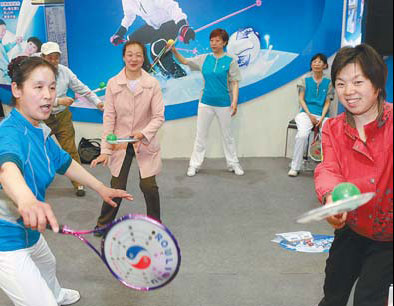Nation to make nursing services affordable for poor elderly
Updated: 2013-05-02 07:57
By He Dan (China Daily)
|
||||||||
|
Visitors play tai chi ball at the second China International Senior Services Expo in Beijing on Wednesday. Feng Yongbin / China Daily |
China strives to provide subsidies to enable poor elderly people who cannot live alone to receive nursing services, Dou Yupei, vice-minister of civil affairs, said on Wednesday.
"Senior citizens' demand for daily care, rehabilitation and nursing as well as spiritual and cultural activities have been increasing day by day," Dou said in a speech at the second China International Senior Services Expo in Beijing.
The government will offer dedicated subsidies for senior citizens on the dole so they can afford rehabilitation and nursing services based on their degree of dependency, he said.
Apart from that, the government will subsidize the poverty-stricken elderly to live in nursing homes or pay for housekeeping services in communities, he said.
Zhan Chengfu, director of the ministry's social welfare and charity promotion department, said 18 local governments have piloted such policies.
China has 36 million senior citizens who cannot live alone, accounting for nearly one-fifth of its gray-haired population, according to the ministry.
The Chinese government defines those aged 60 and older as senior citizens. China has an elderly population of 194 million, and some 23 million lived in poverty as of the end of 2012.
Brian Cao, vice-president of China Care Union Nursing Investment Consulting Co, a nursing company based in Beijing, said his company has provided door-to-door nursing and rehabilitation services for the elderly for the past three years, charging around $20 an hour.
Cao said his company has 2,000 regular clients, and 20 percent suffer from a disability.
He added most of his clients are well-educated and rich seniors, who spend about 3,000 yuan ($486) for the company's services every month on average.
"It's a big expense for ordinary elderly people because we don't have any insurance policies to cover such expenses in China, therefore, those who live on a small pension cannot afford quality services," he said. "This also curbs the development of the whole nursing industry."
Guo Ping, a researcher at the China Research Center on Aging, said most elderly people who have difficulties doing basic daily activities rely on family care.
"Our nursing homes don't have enough beds or nursing staff for these elderly, and sometimes they fear taking responsibilities for any accidents," he said. "So I feel it's more feasible for the government to subsidize seniors' family members who stay at home to take care of them."
hedan@chinadaily.com.cn
(China Daily 05/02/2013 page3)

 Michelle lays roses at site along Berlin Wall
Michelle lays roses at site along Berlin Wall
 Historic space lecture in Tiangong-1 commences
Historic space lecture in Tiangong-1 commences
 'Sopranos' Star James Gandolfini dead at 51
'Sopranos' Star James Gandolfini dead at 51
 UN: Number of refugees hits 18-year high
UN: Number of refugees hits 18-year high
 Slide: Jet exercises from aircraft carrier
Slide: Jet exercises from aircraft carrier
 Talks establish fishery hotline
Talks establish fishery hotline
 Foreign buyers eye Chinese drones
Foreign buyers eye Chinese drones
 UN chief hails China's peacekeepers
UN chief hails China's peacekeepers
Most Viewed
Editor's Picks

|

|

|

|

|

|
Today's Top News
Shenzhou X astronaut gives lecture today
US told to reassess duties on Chinese paper
Chinese seek greater share of satellite market
Russia rejects Obama's nuke cut proposal
US immigration bill sees Senate breakthrough
Brazilian cities revoke fare hikes
Moody's warns on China's local govt debt
Air quality in major cities drops in May
US Weekly

|

|








